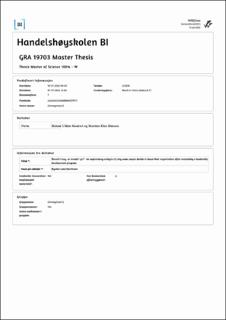| dc.description.abstract | The purpose of this study is to shed light on potential unintended consequences of
leadership development, more specifically why some participants choose to leave
their organization after attending a leadership development program. The main
focus is to investigate how leadership development can influence the participants'
desirability of leaving the organization and perceived ease at leaving the
organization.
The study was conducted by qualitative interviews with former
participants of leadership development programs that had changed professional
positions within two years after the program ended. The sample consisted of 9
participants from various organizations in both the public and private sector in
Norway, and they had all attended leadership development programs held by
different suppliers and facilitators. The research design adopted an exploratory
approach, as the aim was to uncover the subjective experiences of the participants
and search for emerging themes from appearing from the data.
The findings suggests that leadership development may influence the
perceived ease of leaving the organization in multiple ways, such as increasing the
participants perceived mobility capital, increased career ambitions and selfefficacy
beliefs, which could affect the participants accessibility to alternative
opportunities. Additionally, findings suggest that leadership development may
trigger awareness about lack of P-O fit and Perceived Organizational Support
potentially influencing the desirability of other options. The most prominent
finding of why participants leave the organization after leadership development
was lack of desirable and accessible career opportunities in the current
organization. Some findings suggest that leadership development could influence
the career ambitions and expectations towards reaching career goals, and thereby
higher expectations towards career development at the current workplace.
The findings of this study can be used as a suggestion for further research
on the topic, as well as increased attention on what we perceive to be a gap in the
research literature related to unforeseen and unintended consequences of
leadership development | en_US |
